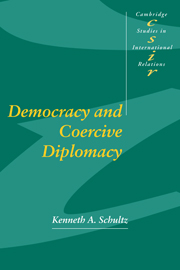Book contents
- Frontmatter
- Contents
- List of figures
- List of tables
- Preface
- 1 Introduction
- Part I Theory
- Part II Empirical analysis
- Appendices
- A Solution to the basic crisis bargaining game
- B Solution to the bargaining game with opposition
- C Data and methods
- D Coding and sources for opposition stances
- References
- Index
- CAMBRIDGE STUDIES IN INTERNATIONAL RELATIONS
C - Data and methods
Published online by Cambridge University Press: 08 October 2009
- Frontmatter
- Contents
- List of figures
- List of tables
- Preface
- 1 Introduction
- Part I Theory
- Part II Empirical analysis
- Appendices
- A Solution to the basic crisis bargaining game
- B Solution to the bargaining game with opposition
- C Data and methods
- D Coding and sources for opposition stances
- References
- Index
- CAMBRIDGE STUDIES IN INTERNATIONAL RELATIONS
Summary
This appendix elaborates on the data and methods used in Chapter 5. It discusses considerations that arise in the coding of the dependent variables; it provides the coding rules and sources for the control variables; it justifies and describes the fixed-effect treatment used in the tests on crisis initiation; and it discusses the correction for temporal dependence included in those models. The appendix ends with a list of states coded as having competitive polities according to the method described in the chapter.
Coding of the dependent variables
The probability of initiation: initiate
For each event, the MID data set identifies the state or states on the initiating side and the state or states on the target side. The initiating side is defined as the side containing the state which took the first codable action – that is, at least a threat to use force. The data set also distinguishes between revisionist and nonrevisionist states, depending upon whether or not the state sought some revision of the pre-existing status quo. Most states on the initiating side are revisionist, but this is not always the case, and revisionist states can be found on the target side or, in many cases, on both sides of a dispute. From the perspective of the hypotheses considered here, it makes sense to rely on the initiator coding rather than the revisionist coding. Initiation, as defined in the data set, refers to the decision by a state to turn some underlying dispute into a crisis by making at least a threat to use force. Regardless of whether or not that threat is accompanied by a demand to change the status quo, it is the initiator who crossed the relevant threshold.
- Type
- Chapter
- Information
- Democracy and Coercive Diplomacy , pp. 261 - 272Publisher: Cambridge University PressPrint publication year: 2001



